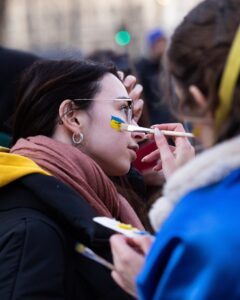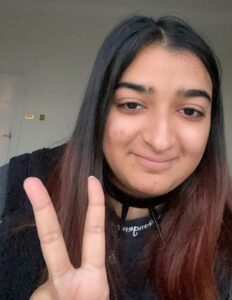In the United Kingdom, war is everywhere in the media. Almost all notifications I receive from the BBC are about the invasion of Ukraine.
The first announcement created this silence of shock among my peers. No one could believe that the president of Russia, Vladimir Putin, went forward with his invasion.
Two days later, my classmates were making jokes about soon being drafted to war, and one girl claimed that we were not going to be drafted – because we are girls.
Someone mentioned that they wished someone like Winston Churchill, the Prime Minister during World War 2, was running the country, not “BoJo” – that is Boris Johnson, the dishevelled leader of the Conservative Party who has inhabited No.10 since 2019.
I understand these jokes as an attempt from us the powerless to somehow cope with the colossal anxiety caused by Putin’s war.
School survey: 47% of students follow Russia’s invasion on Ukraine through social media
By Daria Badger & Noor Bejjani
The war, however, has also rapidly become a subject of serious discussions in my social ‘bubble’, that is my family and friends.
One day, during lunchtime, we were hanging out in the common room, when one of my friends raised the issue of the media’s depiction of the war in Ukraine with how unfair it was for other countries ravaged with war not to receive likewise support from major powers of the West.
She proceeded by showing a video of American news coverage of Ukraine, with the reporter blatantly describing Ukraine as “relatively civilised, relatively European”, thus implying that the people of Syria or Afghanistan are less deserving of our sympathy. Headlined They are ‘civilised’ and ‘look like us’: the racist coverage of Ukraine, Moustafa Bayoumi’s column in the Guardian well describes the thoughts my age group tries to express on TikTok and Instagram nowadays.
These attempts at humour, however, are not in any way standing in the way of genuine feelings of support for Ukraine.
Powerless as we are, a sense of support for Ukraine at my school has consoled the handful of Ukrainian and Eastern European students. A bake sale for the students has been organized to raise funds for refugees from Ukraine, followed by a Mufti day, two-pounds-a-head proceedings being donated directly to the cause.
Also, our Russian friend has not been harassed in any way – apparently, at least where I am, there is no need to explain that regular Russian people have nothing to do with Putin’s actions.
The war has even made it into the curriculum. During economics lessons, we have discussed how the war will affect the average British consumer through inflation, elevated costs of living and increased energy and food prices.
This class made me yet again understand how lucky I am not to be immediately affected, neither by the horror of war nor by its economic fallout.
Ever since the war started, there have been frequent protests and demonstrations in London in support of Ukraine, especially around the Russian embassy and Downing Street.
On Saturday night, some people were out on the streets late after 11 pm, holding up a Ukrainian flag and sign saying “honk four times for Ukraine” and “stop the war”.
We did honk, if only to show these people there that they have our support.
For this war to end, and for Putin to be gone, this is exactly what we want for Ukraine, Russia and the world.



